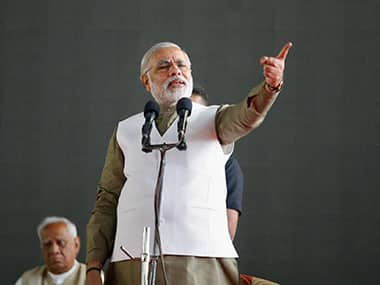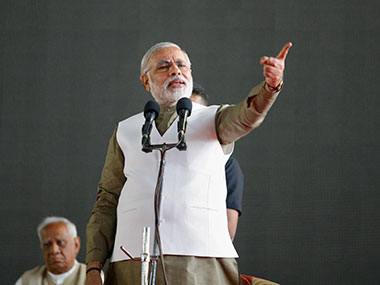Mr Narendra Modi will not be going to Wharton. Even the video image of Mr Modi is anathema to a group of “multiple stakeholders.” This sounds like the mirror image of the Salman Rushdie-Jaipur Literature Festival fracas circa 2012. “We do not even want to see his face. Directly or indirectly by video link,” a protester standing on the front lawns of the festival had said stubbornly at that time. He got his wish. Under pressure from both the state government and protesting Muslim groups, the organisers capitulated rather than risking a messy confrontation in a festival venue crammed with thousands of people. “We feel personally disgraced that after three weeks of struggle we had to give in to those who wish to suppress free speech,” the organisers said in a statement. At least JLF had the grace to admit to feeling “personally disgraced”. And there was the genuine risk of a stampede at Diggi Palace. The Wharton organisers pretended they were saving Modi from “polarising reactions from sub-segments of the alumni base, student body and our supporters” which might have put Modi in “a compromising position.” As if the Lion King of Gujarat was Simba the lion cub who needed protection from the big bad liberals. [caption id=“attachment_647391” align=“alignleft” width=“380”]  Narendra Modi in this file photo. Reuters[/caption] There is an important distinction to be made between Salman Rushdie and Narendra Modi. There was no bar on Rushdie visiting India. Modi is still a persona non grata as far as the US State Department goes. JLF was on solid legal ground inviting Rushdie to the festival to speak about Midnight’s Children, a book on which is there is no export ban in India. The Wharton India Economic Forum was quietly bypassing its own government by summoning up Modi via video link (a tactic that had already been used by the Gujarati-dominated Asian American Hotel Owners Association). And pressure from the state to force a literary festival to disinvite a guest is a different kettle of fish altogether from a debate within a student and alumni body about who should speak at its own conference. But having said that, the grand snub of Modi is more the forum’s loss than Modi’s. It’s no secret that Narendra Modi is on an Ashvamedha Yajna of sorts to knock out all obstacles in the path to being anointed the BJP’s prime minister-in-waiting. Yesterday SRCC, Today BJP national council. Tomorrow 10 Downing Street perhaps. Modi’s rah-rah supporters would triumphantly hail his Wharton speech in March as one more bastion falling to the inevitable might of his victory procession. A petition that demanded Wharton cancel the invitation said “Recently there have been efforts to whitewash Modi’s grim record and to grant him respectability. Wharton’s invitation lends itself to doing just that.” They are correct. And they are well within their right to protest his inclusion on the roster. Narendra Modi might think he can ignore the horrific events of 2002. That does not mean those who oppose him and his politics need to “move on” as well and unroll the welcome mat for him. Election victories don’t count as absolution. But by choosing to disinvite him the organisers have made one speech via Skype a far bigger issue than it ever needed to be. They have allowed Modi to paint himself in his favourite colours – a freedom-of-expression victim, the patriot hounded by a leftie academic lynchmob. They could have used the opportunity to actually insist on a Q&A with Modi and challenged him about his record. And there are many tough questions to be asked of Modi. For example, are the riots of 2002 not at the very least a massive failure of governance? And should a CM who prides himself on “maximum governance”, and is being invited to international forums to talk about governance, not be held accountable for that? Can a figure as polarising as Modi ever lead a coalition of increasingly powerful regional leaders? While a section of the middle class might dream of a “Gujarat makeover” for India, does the rest of India want to become Gujarat? Does the Gujarat development model have a price and who has paid it? In the aftermath of Godhra, the campaign to prevent a sitting chief minister from getting a US visa had a certain moral urgency. However now by withdrawing an invitation that had already been given, while still claiming to be “extremely impressed by Modi” the Wharton organisers just look like they are ducking a debate while purporting to host a forum that is all about dialogue. More than the Rushdie affair it sounds like a replay of the Subramaniam Swamy-Harvard firestorm from a couple of years ago. At that time students and faculty at Harvard demanded the university sever its ties with Dr Swamy because of a reprehensible fear-mongering op-ed he published in DNA. Instead of creating an open zone for debate and hoisting Swamy on his own words, they chose to chill all debate and in the process allowed Swamy to become a political martyr. Swamy has long been a megaphone in search of a political party. Harvard helped amplify his volume. The organisers at Wharton need to realise that whether Modi has a Skype durbar with them or not will not affect his master plan for the prime ministerial gaddi in India. Speaking at the Wharton India Economic Forum is not a must-do item on any would-be prime minister’s checklist. It’s not like the ones who extended the invite were in the dark about the riots and carnage of 2002 because they were so dazzled by Modi’s “credentials, governance ideologies and leadership” . The right thing Wharton organisers should have done was hold a full-fledged debate among these “multiple stakeholders” about inviting Modi in the first place. Now thanks to its last minute volte face, Modi still gets to play lion. It’s the organisers of the Wharton India Economic Forum who end up being chicken.
Narendra Modi’s opponents have every right to object to his speaking at the Wharton forum. But by disinviting him, while still claiming to be “extremely impressed” by him, the India Economic Forum looks like they ducking a debate and letting Modi play the martyr.
Advertisement
End of Article


)
)
)
)
)
)
)
)
)



